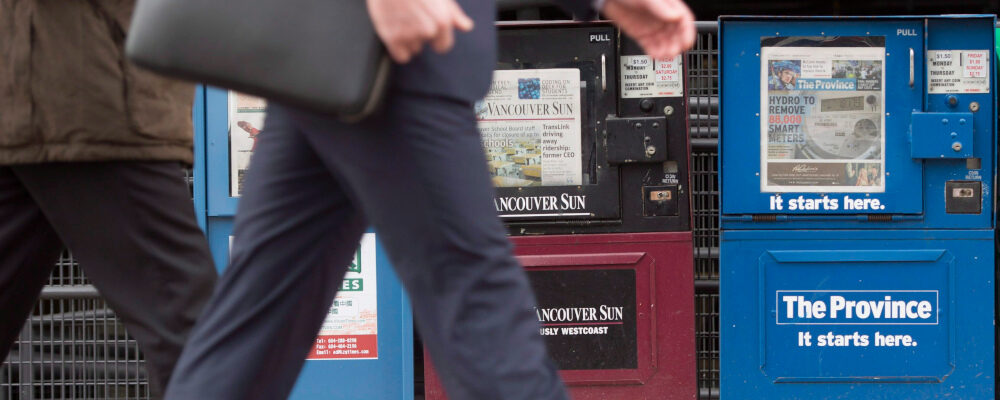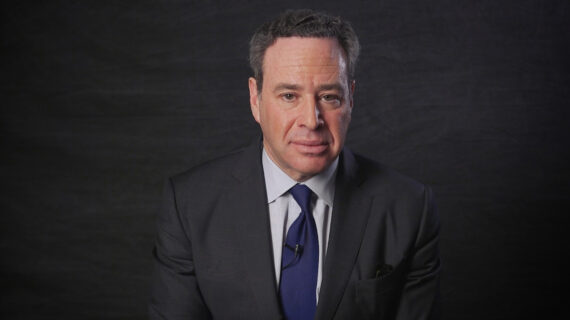The popular current affairs podcast, The Herle Burly, recently had veteran journalists Andrew Coyne, Paul Wells, and Joyce Napier on as guests to discuss the state of Canadian journalism and its future in the face of considerable market disruption. It was a fascinating and informative conversation.
Following its release, someone tweeted that David Herle, the show’s host, ought to have a parallel conversation with voices from the world of independent news media and media start-ups, including a representative from The Hub, in order to get a different perspective.
It made us wonder what we would say if asked to participate in such a conversation. How have our more than two years publishing The Hub informed our views on a news media landscape reshaped by growing government subsidies, an explosion of small start-ups, and experimentation with different business models including not-for-profits and charities? We’ll come back to that in a moment.
First we need to confront a more fundamental question: are recent developments in the news media industry—namely a significant reduction in the legacy news media’s capacity and growing consolidation within the legacy media itself—a problem? The answer, in our view, is yes.
Although we are highly optimistic about the future of the news media based on the high degree of innovation occurring in the world of independent media (which involves various forms, perspectives, and sizes), we accept that there’s a timing problem that needs to be addressed.
That is to say, while the long-term solution to the market’s disruption of the legacy news media likely lies in some version of the various start-ups currently trying to figure out the market, they don’t presently have the scale or capacity to fully replace the legacy media which, for better or for worse, remains principally responsible for the production and distribution of the news content that citizens require to be informed participants in our democracy. We, therefore, face an unknown transition period between when a new, more sustainable model can reach the minimum scale to fulfill this public good and the possible risk of a serious collapse in news content in the meantime.
If one accepts this premise, it follows logically that there may be a role for public policy to help smooth out that transition. It’s important however that any policy intervention is as neutral as possible. Policies that preference established incumbent players over media start-ups risk distorting the market and impeding rather than enabling the eventual transition to a consumer-supported media landscape.
We’ve been critical of Bill C-18 (Online News Act) for this reason. Although it may not have been intended or fully understood, the policy outcome increasingly appears to be a failed attempt to secure financial resources for incumbent outlets at the expense of start-ups’ ability to promote and disseminate their content on the big distribution platforms hosted by Meta and Google.
It’s the digital policy equivalent of subsiding coal production at the same time that the market is transitioning to new forms of energy. Such a policy would rightly be criticized as the government trying to effectively impede the market’s proper functioning in favour of a legacy player or technology.
Yet, in the Canadian context of rapacious rent seeking across our economy (think for instance battery plants), it should come as no surprise that this is a major consequence of Bill C-18 as currently configured. If not substantially revised in the regulation-making phase, the Act will entrench several large and already, for all intents and purposes, failed media outlets for an indeterminate period. These same outlets will continue to bleed resources and talent and Canadians will be forced to live with an even thinner gruel of news and information about their communities, institutions, national affairs, and ultimately the public policy issues that will shape our collective future.
Put bluntly: any policy intervention in the news media market should see as its primary aim to enable the transition away from the failed legacy media model to new, different, and more sustainable ones. Put more bluntly: the goal ought to be to move beyond the CBC or the Toronto Star or whomever else rather than to try to sustain them in their current ossified forms.
Which brings us back to The Hub. The Hub is a charitable start-up that, similar to some online media organizations, produces insights and analysis that it disseminates via a regular newsletter, its own webpage, podcast channel, and social media platforms. Its focus is mainly Canadian national affairs and public policy, though in the past week alone we’ve covered topics as diverse as the federal Cabinet shuffle, the Bank of Canada’s efforts to restrain inflation, UFOs, and Sinead O’Connor’s death.
The key difference is that The Hub is organized as a charitable initiative that’s able to receive donations from individuals and philanthropic foundations. Major gifts by public-spirited foundations such as the Donner Canadian, the Hunter Family, and others inoculate The Hub to a certain degree from the vicissitudes of the market while providing all our content free to the public to read, watch, and listen on-demand.

This enables us to resist rank punditry or the “who’s-up-and-who’s-down” tendency inherent in much of contemporary journalism’s coverage of national affairs. Our analysts and contributors are able to go deeper into issues that are underexplored by the legacy news media such as the complexities of Canada’s fast-growing population of international students or the future of Canadian conservatism or the jurisprudential consequences of Supreme Court Justice Russell Brown’s resignation.
It has also enabled us to grow. While most news media organizations are rationalizing their operations and content, we’re doing the opposite. Just this year alone, we’ve launched a new bi-weekly podcast series on business and economics with award-winning journalist Amanda Lang, produced a five-part video and podcast series on Canada’s state capacity that she’s also hosting for us, produced a major series on the economics of our health-care system, and kicked off the inaugural Hunter Prize for Public Policy to award innovative public policy ideas from a new generation of policy practitioners and thinkers, as well as established a core group of regular contributors that, in our view, holds its own with any in the industry.
This progress has come to manifest itself in growing numbers of users, page views, podcast downloads, subscribers, and individual donors. Consumers are increasingly affirming what we’re doing. In fact, we’re now consistently reaching a weekly audience of more than 200,000 users across our platforms. It’s been a difficult yet highly rewarding experience to get to this point and kudos here goes to The Hub‘s hard-working editorial team of Stuart Thomson, Luke Smith, and Amal Attar-Guzman.
The future of Canadian journalism is likely to come in different shapes and forms.
So we suppose that if we were asked to participate in a discussion about the current and future state of Canadian journalism, we’d bring with us the pragmatic optimism that stems from our experience at The Hub. We’re both clear-eyed about the short-term challenges and confident about the long-term solutions.
The former warrants our collective attention. The Hub and other newer players like it aren’t currently in a position to replace the major news outlets. But we’re constantly experimenting, innovating, and growing, and eventually some number of us are going to figure out how to reach scale and restore a sustainable market-supported model to the industry either as for-profit entities or inside entirely different governance structures and economic models. The point is that what comes next won’t be a single model. The future of Canadian journalism is likely to come in different shapes and forms.
But the latter means that government policy cannot stand in the way of fundamental change. It should instead aim to smooth out some of the bumps in the transition but understand that its goal must ultimately be a shift to something new rather than preserve something old.
It’s regrettably however not been part of the debate around the Online News Act or within the legacy news media itself (surprise, surprise). That’s a missed opportunity for the industry, consumers, and the health and vitality of Canadian journalism that our democracy and civic life ultimately needs to thrive.
So, David Herle if you are reading this, let’s have the conversation. We are game as are the other start-ups out there trying to solve, in their own ways, for the future of Canadian journalism.




